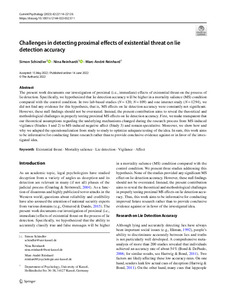Aufsatz

Challenges in detecting proximal effects of existential threat on lie detection accuracy
Abstract
The present work documents our investigation of proximal (i.e., immediate) effects of existential threat on the process of lie detection. Specifically, we hypothesized that lie detection accuracy will be higher in a mortality salience (MS) condition compared with the control condition. In two lab-based studies (N = 120; N = 109) and one internet study (N = 1294), we did not find any evidence for this hypothesis, that is, MS effects on lie detection accuracy were constantly not significant. However, these null findings should not be overstated. Instead, the present contribution aims to reveal the theoretical and methodological challenges in properly testing proximal MS effects on lie detection accuracy. First, we make transparent that our theoretical assumptions regarding the underlying mechanisms changed during the research process from MS-induced vigilance (Studies 1 and 2) to MS-induced negative affect (Study 3) and remain speculative. Moreover, we show how and why we adapted the operationalization from study to study to optimize adequate testing of the idea. In sum, this work aims to be informative for conducting future research rather than to provide conclusive evidence against or in favor of the investigated idea.
Citation
In: Current Psychology Volume 42 / Issue 25 (2022-06-14) eissn:1936-4733Sponsorship
Gefördert im Rahmen des Projekts DEALCitation
@article{doi:10.17170/kobra-202310188868,
author={Schindler, Simon and Reinhardt, Nina and Reinhard, Marc-André},
title={Challenges in detecting proximal effects of existential threat on lie detection accuracy},
journal={Current Psychology},
year={2022}
}
0500 Oax
0501 Text $btxt$2rdacontent
0502 Computermedien $bc$2rdacarrier
1100 2022$n2022
1500 1/eng
2050 ##0##http://hdl.handle.net/123456789/15113
3000 Schindler, Simon
3010 Reinhardt, Nina
3010 Reinhard, Marc-André
4000 Challenges in detecting proximal effects of existential threat on lie detection accuracy / Schindler, Simon
4030
4060 Online-Ressource
4085 ##0##=u http://nbn-resolving.de/http://hdl.handle.net/123456789/15113=x R
4204 \$dAufsatz
4170
5550 {{Sterblichkeit}}
5550 {{Sterbeziffer}}
5550 {{Lügendetektor}}
5550 {{Aufmerksamkeit}}
5550 {{Affekt}}
7136 ##0##http://hdl.handle.net/123456789/15113
<resource xsi:schemaLocation="http://datacite.org/schema/kernel-2.2 http://schema.datacite.org/meta/kernel-2.2/metadata.xsd"> 2023-10-18T12:09:15Z 2023-10-18T12:09:15Z 2022-06-14 doi:10.17170/kobra-202310188868 http://hdl.handle.net/123456789/15113 Gefördert im Rahmen des Projekts DEAL eng Namensnennung 4.0 International http://creativecommons.org/licenses/by/4.0/ Existential threat Mortality salience Lie detection Vigilance Affect 150 Challenges in detecting proximal effects of existential threat on lie detection accuracy Aufsatz The present work documents our investigation of proximal (i.e., immediate) effects of existential threat on the process of lie detection. Specifically, we hypothesized that lie detection accuracy will be higher in a mortality salience (MS) condition compared with the control condition. In two lab-based studies (N = 120; N = 109) and one internet study (N = 1294), we did not find any evidence for this hypothesis, that is, MS effects on lie detection accuracy were constantly not significant. However, these null findings should not be overstated. Instead, the present contribution aims to reveal the theoretical and methodological challenges in properly testing proximal MS effects on lie detection accuracy. First, we make transparent that our theoretical assumptions regarding the underlying mechanisms changed during the research process from MS-induced vigilance (Studies 1 and 2) to MS-induced negative affect (Study 3) and remain speculative. Moreover, we show how and why we adapted the operationalization from study to study to optimize adequate testing of the idea. In sum, this work aims to be informative for conducting future research rather than to provide conclusive evidence against or in favor of the investigated idea. open access Schindler, Simon Reinhardt, Nina Reinhard, Marc-André Seiten 22114-22126 (13 Seiten) doi:10.1007/s12144-022-03237-1 Sterblichkeit Sterbeziffer Lügendetektor Aufmerksamkeit Affekt publishedVersion eissn:1936-4733 Issue 25 Current Psychology Volume 42 false </resource>
The following license files are associated with this item:


